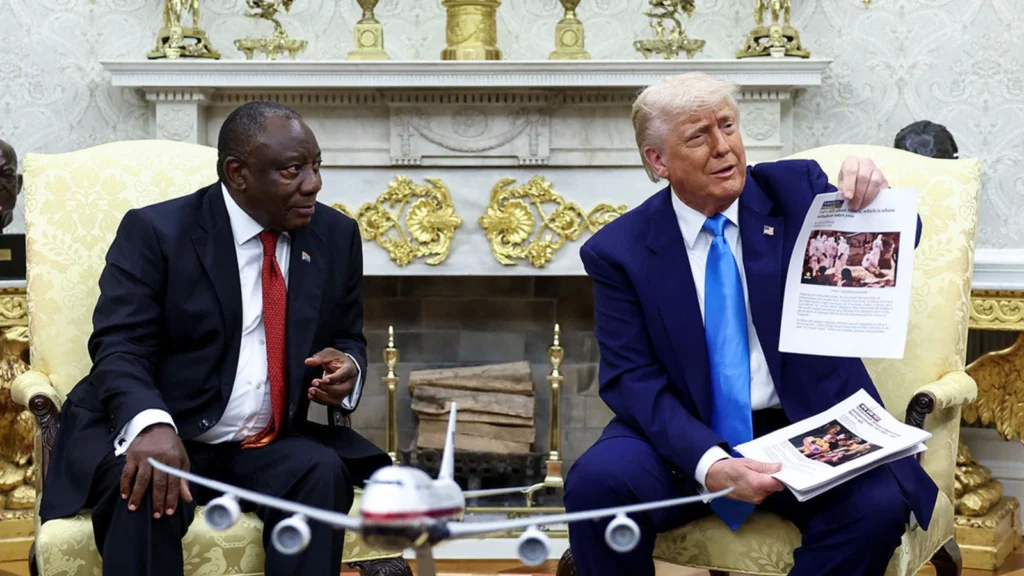Controversy Erupts in South Africa as Trump Challenges Ramaphosa
In a dramatic exchange during a recent meeting in the White House, former U.S. President Donald Trump took aim at South African President Cyril Ramaphosa, bringing attention to the ongoing tensions within South Africa regarding issues of race and land reform. The confrontation has sparked heated discussions among South Africans, revealing a deep divide in opinion regarding the country’s political landscape and its relationship with the United States.
Support from Right-Wing Groups
Trump’s remarks were met with enthusiasm from right-wing Afrikaner groups, such as the Solidarity Movement, which has been actively lobbying the U.S. government to spotlight what they claim is systemic persecution of white South Africans. Ernst Roets, a prominent figure within this movement, expressed his admiration for Trump, stating, “Donald Trump made history today.” Furthermore, Roets praised the display of videos showcasing the controversial song “Shoot the Boer,” performed by opposition politician Julius Malema.
Jaco Kleynhans from Solidarity highlighted his appreciation with a bold proclamation, asserting that Trump deserves a Nobel Prize for bringing the issue of farm murders to global attention. However, not all Afrikaners support this narrative. Political analyst Pieter du Toit criticized the sensationalism that has permeated American discourse about South Africa, stating that the exaggerated claims have influenced U.S. politics damagingly.
Calm Response from Ramaphosa
During the encounter, President Ramaphosa maintained composure, carefully rebutting Trump’s assertions concerning white persecution. Acknowledging South Africa’s challenges, Ramaphosa underscored the nation’s commitment to unity and democracy, pointing out that while he denounces Malema’s rhetoric, the Economic Freedom Fighters (EFF) have a right to express their views within South Africa’s constitutional framework.
Ramaphosa’s delegation included notable representatives, such as John Steenhuisen, leader of the Democratic Alliance, who emphasized the importance of collaborative governance to address South Africa’s critical issues, including the high crime rate and staggering unemployment, which disproportionately affects black South Africans. Steenhuisen stated, “The reality is that the agricultural sector in our country has a majority of farmers who wish to remain.”
The Role of Controversial Music
Trump’s presentation of the “Shoot the Boer” song has reignited debates surrounding its implications and how it is interpreted in a contemporary light. South Africa’s Supreme Court of Appeal previously ruled that such songs should not be taken literally, viewing them as a form of political expression rather than incitements to violence. Nonetheless, the continued emphasis on this controversial anthem by groups like the EFF complicates the dialogue about race relations in South Africa.
Wider Reactions and Criticisms
The meeting left many South Africans feeling uneasy, with critics arguing that right-wing groups demonstrated a lack of loyalty to their country by appealing to the U.S. for intervention. Commentators pointed to the unity within the ruling coalition, which includes parties from across the political spectrum, as a testament to South Africa’s resilient democracy.
| Aspect | Details |
|---|---|
| Main Tension | Racial issues and land reform debates |
| Key Participants | Donald Trump, Cyril Ramaphosa, John Steenhuisen |
| Opposition Party | Economic Freedom Fighters (EFF) |
| Current Farming Sentiment | Majority of farmers wish to remain in South Africa |
Billionaire businessman Johann Rupert and trade union leader Zingiswa Losi also contributed perspectives on the multifaceted nature of South African crime, emphasizing that it affects all communities, not just a singular ethnic group. They urged policymakers to focus on economic development and job creation as essential pathways to addressing safety concerns.
As the nation reflects on this contentious encounter, the division between perceptions of safety, crime, and race continues to loom large over South Africa’s future.


